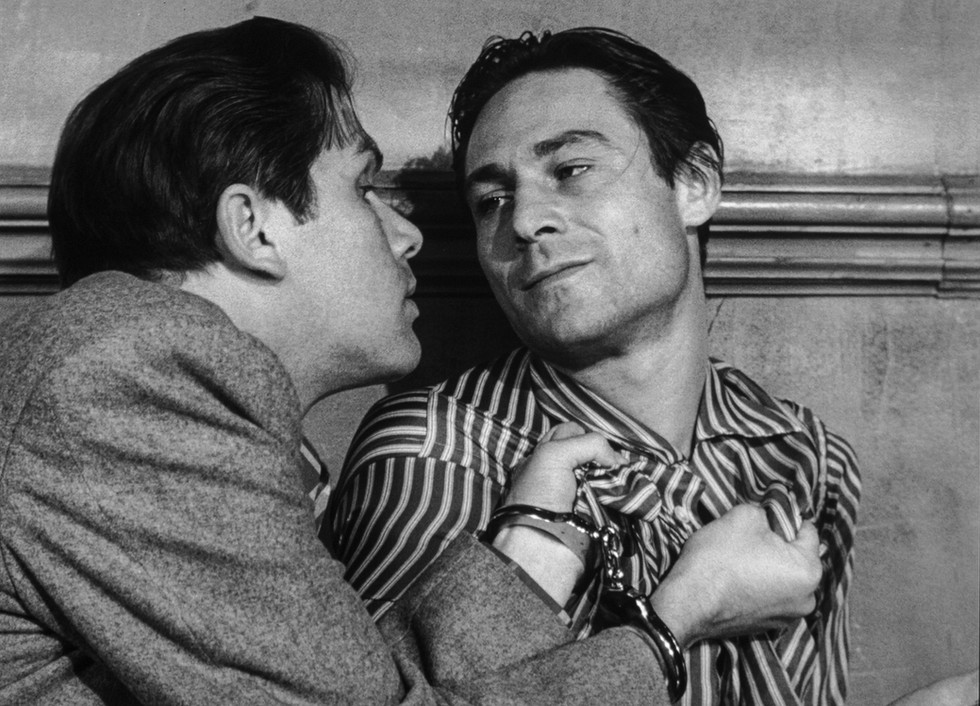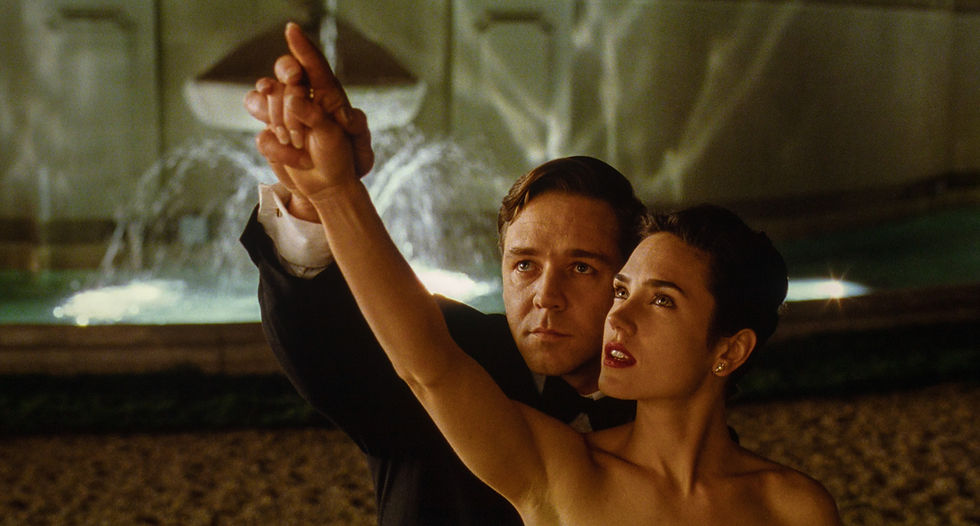1950s taboos drive William Wyler’s “Detective Story”
- Peggy Earle

- Dec 23, 2022
- 4 min read
BLU-RAY REVIEW / FRAME SHOTS

Kirk Douglas plays James McLeod, a hard-edged New York City police detective, who rough-ups Karl Schneider (George Macready), a New Jersey baby broker wanted on murder charges.
(Click an image to scroll the larger versions)
“DETECTIVE STORY”
Blu-ray; 1951; Not Rated
Best extra: The only extra is a commentary by author/film historian Alan K. Rode
KIRK DOUGLAS gives one of his most Kirk Douglas-y performances in “Detective Story,” an exceedingly dark film noir based on a popular Broadway play by Sidney Kingsley.
Produced and directed by the great William Wyler (“The Best Years of Our Lives,” “Mrs. Miniver,” “Ben-Hur,” “The Heiress,” “Funny Girl” and “The Little Foxes”), the story focuses on James McLeod (Douglas), a hard-edged New York City police detective. McLeod has a loving, beautiful wife named Mary (Eleanor Parker, nominated for an Oscar for her role), but their apparently blissful marriage is put to a test. Douglas gets to do a whole lot of voice-cracking emoting, as McLeod’s rigid morality is tested when his personal life coincides with a case he’s working on.
One side story about a shoplifter (Lee Grant, in her first screen role) waiting to go to night court, provides some comic relief. Another involves an otherwise decent young man (Craig Hill) who’s been arrested for embezzlement. The cast of “Detective Story” is uniformly (pardon the pun) excellent, packed with familiar faces like William Bendix, George Macready, Frank Faylen, and a very histrionic Joseph Wiseman reprising his Broadway role. This is an out-and-out melodrama, and very much of its time, in terms of 1950s taboos and prejudices. The moments of humor, the convincing atmosphere of an inner-city police department, and some realistic moral dilemmas, are what keep it from being too over the top.
(1) “Detective Story” premiered in Los Angeles on October 24, 1951. (2) Mrs. Farragut (Catherine Doucet) makes her regular visit to the busy 21st Precinct to complain about her neighbors. She thinks they are making an Atom Bomb. (3) Lieutenant Monaghan (Horace McMahon) has a quick shave when attorney Endicott Sims (Warner Anderson) enters his office. (4) Detective McLeod spends a romantic moment with his wife Mary (Elenor Parker). (5) Lt. Monaghan warns McLeod to not lay a hand on Karl Schneider. (6) Lee Grant plays an unnamed shoplifter, who calls her lawyer brother-in-law for help.
VIDEO/AUDIO
This Kino Lorber Blu-ray looks very good, sourced from a new Paramount 4K master that was made from the original 35mm negative and best surviving elements. The black and white video maintains a satisfying grain throughout, with all the fine detail you could want. There’s plenty of depth, as well as excellent gradations from light to dark. The single audio track DTS-HD Master Audio 2.0 is also first-rate, with dialogue clear and the modest score very effective. English subtitles are available.
EXTRAS
The sole bonus feature is the commentary, which is more than worth the time for cinephiles to check out. Alan K. Rode begins by discussing censorship and the MPAA production code films were subjected to in the early 1950s. He notes that “Detective Story” “tested and loosened certain arcane rules.” The musical cues used in the beginning and end titles, as Rode points out, are borrowed: the opening credits appear with music by Victor Young from the 1949 film “The Accused”; the end credits come with Miklós Rózsa’s theme from “Double Indemnity.”
Rode provides meaty bio information on each actor, such as that Pat Flaherty, who plays one of the policemen, was a former pro football and baseball player who served as technical adviser on “The Pride of the Yankees.” Frank Faylen (the cab driver from “It’s a Wonderful Life”) ended up playing Dobie Gillis’ father in the early 1960s television series. Joseph Wiseman portrayed “Dr. No” in the first Sean Connery James Bond movie. Lee Grant, who was nominated for a best supporting actress Oscar, was later blacklisted for 12 years because she was married to a member of the American Communist party. Her later career included acting in and directing films, as well as a long stint on the TV series “Peyton Place.” Rode describes Kirk Douglas’ life as a true American success story, beginning in very modest circumstances and working his way into stardom. Douglas spent time riding along with both Los Angeles and New York police officers to prepare for his role in “Detective Story.”
(1) The detectives question burglary suspect Lewis Abbott (Michael Strong). (2) Ms. Hatch (Gladys George) doesn’t ID Schneider during a lineup since she was bribed with a fur coat. (3&4) McLeod escorts Schneider to the city jail and it gets ugly. (5) Embezzler suspect Arthur Kindred (Craig Hill) is embarrassed with the arrival of his girlfriend’s sister Susan Carmichael (Cathy O’Donnell).
Rode explains that Wyler, who ultimately co-wrote the screenplay for “Detective Story,” originally wanted Dashiell Hammett to write it. Wyler gave Hammett an advance to do so, but the legendary writer returned the money because he had become too ill by then.
The MPAA code, notes Rode, forbade a crucial plot point from the stage version that dealt with abortion. Wyler reluctantly changed the evil Dr. Schneider character (George Macready), who performed illegal abortions and caused the death of one of his patients, to a doctor who secretly delivers “illegitimate babies,” and runs a “baby mill” to sell them to wealthy families. Rode says that getting Kingsley’s play onto the screen was “an uphill battle,” but Wyler had so much clout at that point, he prevailed in most cases, including having a police officer character killed by a criminal on camera. The director openly supported the “Hollywood 10” during the McCarthy hearings, but his “impeccable reputation and his military service in World War II” made him “untouchable for even the most rabid of red-baiters,” says Rode.
— Peggy Earle
(1-3) Jim and Mary’s relationship is tested when she reveals a past lover. (4) Robbery suspects Charley Gennini (Joseph Wiseman) and Abbott who wants his share of the $1,400. (3) Joe Feinson (Luis Van Rotten) and Detective Lou Brody (William Bendix) try to convince Jim to release Arthur Kindred and to forgive Mary. (4&5) Gennini grabs a gun from a policeman and Det. McLeod contemplates his next move.








































Can you review The city of lost Children on 4K thank you.